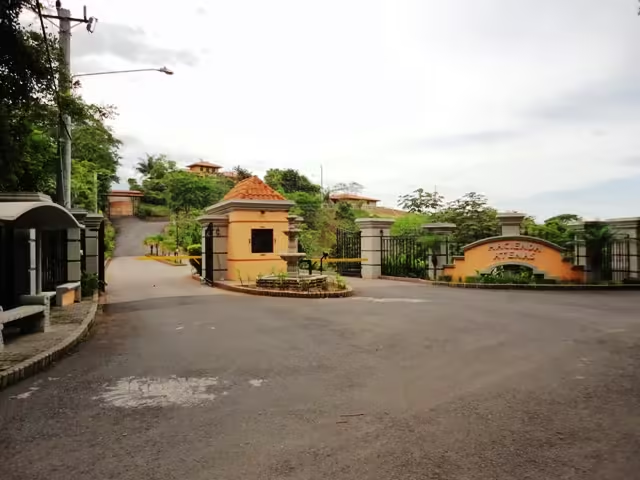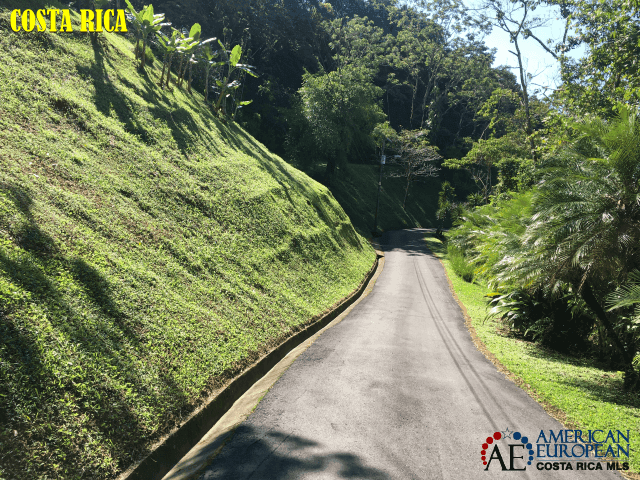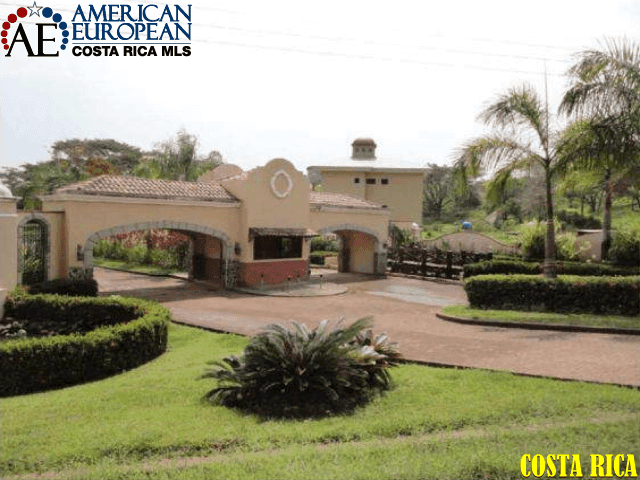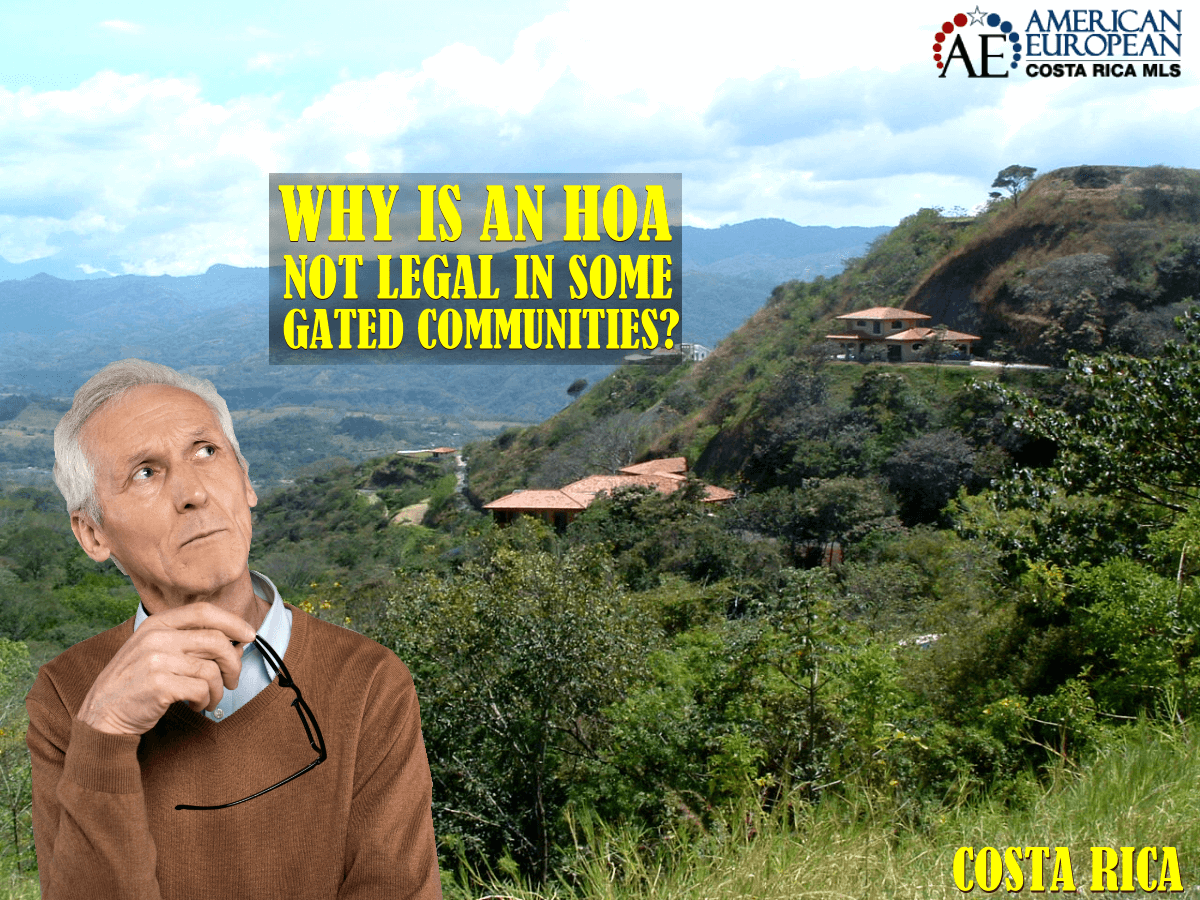Estimated Reading Time: 6 Minutes
Is an HOA or Homeowner Association legal in Costa Rican gated communities? The short answer is yes if the gated community is legally constituted in the National Register as a condominium.
In a legally constituted condominium, the common areas are shared by all the owners of the properties within this condominium, and they share the responsibility of maintaining these common areas. Each property owner owns a percentage of the total common areas, depending on the size of their property. So, if all properties are the same size, they all own the same percentage, which gives them the same amount of votes during the HOA meetings.
In Costa Rica, hundreds of communities are called “gated communities” because they have a gate at the front, sometimes with a guard and sometimes with a remote-controlled gate.
How can you determine if that’s the case without hiring an attorney? A condominium property has a title number that shows that it’s a finca filial, a unit, or subsidiary property, with an F in the title number, 1-123456-F-000, for example. You can check the title yourself online.

The Constitution of the Condominium
Condominiums are regulated by Law 7933, Ley Reguladora de la Propiedad en Condominio. The constitution of the condominium describes
- Where the property is located
- The name of the condominium.
- Home Owner Association: This is the supreme body of the Condominium, composed of the owners of the subsidiary properties.
- The description of each unit what their percentage of ownership of the common area is
- The obligations of the homeowners and how to behave within the condominium (bylaws or CC & R’s)
- How the board must be elected
- How the management must be hired and registered formally
- Many other issues might include view easements, construction committees, the architectural design of each house, the color of exterior paint used, etc.
Agricultural Properties
During the 2006 – 2008 real estate boom, developers couldn’t build fast enough because the demand for property in secure gated communities was huge. Real Estate developers found a loophole in the law. This made it possible to create an agricultural subdivision in certain areas with low density (Fraccionamientos Agricolas). To do so, the developer only needed an unpaved easement as access and a minimum lot size of 5,000 m2 (1.25 acre) and, in some cases, 7,000 (1 ¾ acre). The zoning allows the building of one house on the “farm” with extra buildings like a “barn,” which could be used as a guesthouse and even a swimming pool.
Utilities
The real estate developer must supply the individual properties with water. Without this water letter, obtaining construction permits from the municipality is impossible. The developer might have to hook the community with the national water company AyA if there is any service in the area. If the development is in a rural area (Fraccionamientos Agricolas usually are), the developer can hook up with an existing asada (similar to a water cooperative) if there is one in the immediate area with enough water. If not, the developer can request permits to drill a well, create an asada, and register this with AyA.
Of course, it’s also necessary to install power on each lot.

Bad news?
Some real estate developers had enough money to pave the easement and drill a serviceable well; others did not. Every developer ran against the clock during the boom to get everything legalized and built. In 2006, there were hardly any governmental controls. The boom was short; in 2008, the bubble burst, so many promises were not delivered.
For that reason, you will find some Costa Rican gated communities finished, some unfinished, and others somewhat or totally abandoned. Sadly, when lot owners started building their homes, they did not worry about who would maintain infrastructure such as roads, power poles, and water wells.
All the “gated communities” are now well organized in Atenas, and a few are in Puriscal, although not everyone pays the fees. They have formal homeowner organizations with bank accounts and financial controls, a Whatsapp group for emergencies, and other tools. You’ll also find such communities in the South Pacific, the Central Pacific, and the North Pacific, mainly in the mountain ranges that offer ocean views.
What’s Important?
It is important to understand that the government has no obligation to maintain the infrastructure of those informal Costa Rican gated communities. So if the individual property owners don’t chip in, they won’t have roads in a few years. Water and power are not problems; each property owner must pay to receive the service. The problem is in the road, gutters, retainer walls on the road, and rainwater run-offs. What happens if a landslide occurs because the gutters and road are not maintained? Nobody but the property owners of the community is responsible. The maintenance of empty lots is another problem because there can be wildfires during the rainy season. So, those agricultural communities that were not condominiums now had to get organized to keep the roads, gates, and often the water supply organized.
Under the developer’s control
Developers usually control everything (gate, road, gutters, and water maintenance) until they sell more than 50% of the properties. After that, the homeowners should take over and not leave it to the real estate developer. I have heard of developers who control the community by charging a monthly fee, often without showing the participating owners any financial statements. Those owners who keep giving those developers their money are asking for trouble.
Some agricultural communities have organized themselves well and cut off an ongoing income stream for the developer by constituting a corporation or Sociedad Anonima, including all participating property owners. Participation in this organization is not mandatory for any of the property owners. because their community is not legally constituted as a condominium.

Form a formal group
But, you can save yourself headaches and wasted money by forming a formal group of participants who can constitute specific regulations to organize, for example:
- Front Gate operations,
- Community Security,
- Road Maintenance and Repair,
- Common Ground Maintenance,
- Maintenance of Structures,
- Trash Operation,
- Community Governance.
You must understand that this is only mandatory for the participants. Those property owners who do not participate have no obligations but are often not treated as good neighbors, and with good reason, in my opinion.
Because the organization is now formal, with a board of directors and a formal financial organization, Sociedad Anónima can have
- corporate books with formal meetings,
- a bank account,
- financial audits, etc.
This way, the owners keep control of their own community and its financials and keep it out of the hands of a developer who has nothing to do with what he has sold anymore. Talk to a lawyer and an accountant before you do anything.
Who is the bad guy?
Whose fault is all this? Legally, it’s no one’s fault. The real estate developer was legally entitled to constitute a community in such a way, and the developers didn’t foresee the problems that would knock on the property owner’s doors years later either. It’s a legal limbo.
My message: Owning a property in agricultural gated communities should not be a problem. I suggest you do your homework before purchasing real estate in any of the Costa Rican gated communities or ask your lawyer to do the due diligence for you. Then, you can make a well-informed decision. When you are ready to purchase property in Costa Rica, you can contact us for professional assistance.


















